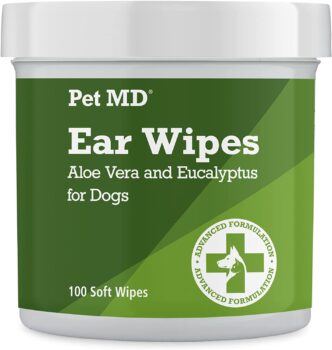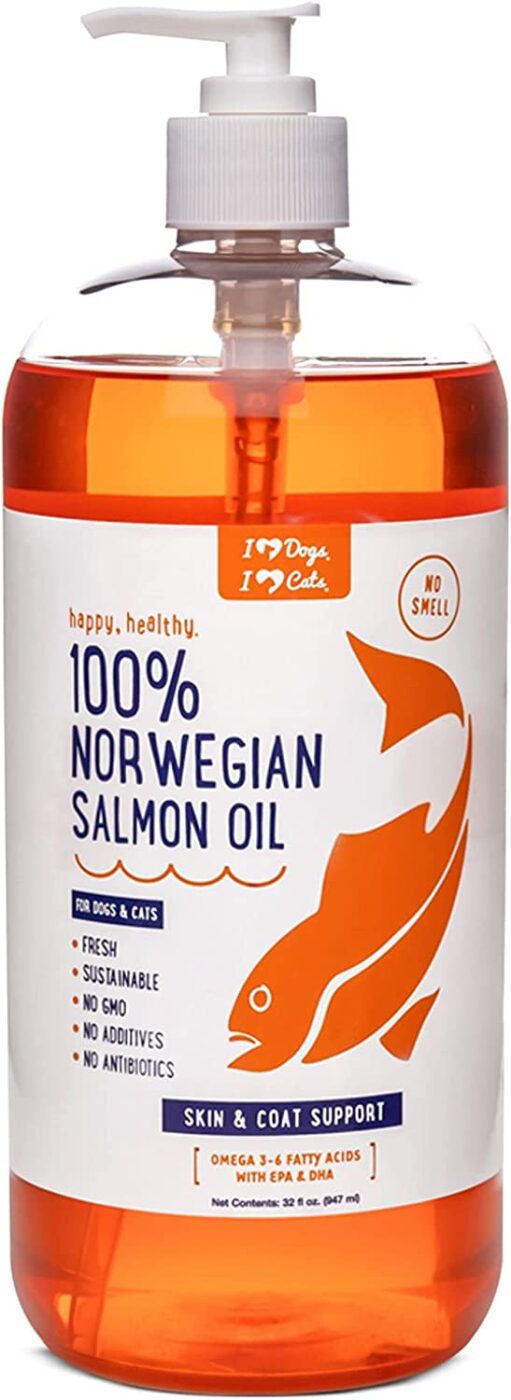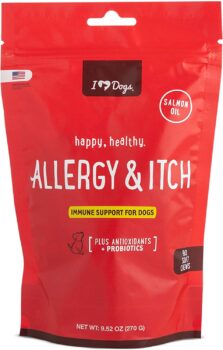Rhodesian Ridgebacks are a loyal and energetic breed that makes for a perfect family pet. Like all breeds, they have their health challenges, and one common issue they face is ear infections. The prevention and treatment of ear infections in Rhodesian Ridgebacks require a comprehensive approach, and the incorporation of Omega-3 in their diet can be beneficial in this endeavor. Here are 11 ways to combat these infections:
 iHeartDogs is reader supported. Some of the links below may be paid affiliate links, where we receive a small commission on a product at no additional cost to you.
iHeartDogs is reader supported. Some of the links below may be paid affiliate links, where we receive a small commission on a product at no additional cost to you.
1. Regular Ear Cleaning
One of the most effective ways to prevent ear infections is by maintaining a consistent ear-cleaning regimen. This will help to remove any build-up of wax, dust, or debris that can be breeding grounds for bacteria or yeast.
Our favorite ear cleaner is these PetMD brand ear wipes on Amazon.
2. Thorough Drying After Swimming or Bathing
Rhodesian Ridgebacks love to swim, but water left in their ears can lead to infections. Make sure to thoroughly dry your dog’s ears after they’ve been in the water to prevent this.
3. Include Omega-3 Fatty Acids in Their Diet
Omega-3 fatty acids have been shown to boost the immune system and reduce inflammation, which can help to prevent ear infections. Consider including fish, like salmon or mackerel, or Omega-3 supplements in your dog’s diet.
We’re fans of this Norwegian salmon oil on Amazon. It’s a bright orangish-pink color and has no fishy smell at all due to its ultra-high purity.
4. Regular Veterinary Check-Ups
Regular vet checks can identify early signs of ear infections and ensure they are dealt with promptly, preventing further complications.
5. Identification and Removal of Allergens
Certain allergens can cause inflammation leading to ear infections. Identifying these allergens and removing them from your dog’s environment can significantly reduce the risk.
A few good supplements to help your dog’s allergies are apple cider vinegar, quercetin, and colostrum, all of which are found in many natural allergy supplements like this one.
6. Keep Up-To-Date With Vaccinations
Regular vaccinations can help to strengthen your dog’s immune system, preventing a variety of diseases including ear infections.
7. Use Prescribed Medications
If your Rhodesian Ridgeback does develop an ear infection, it’s important to administer the full course of any prescribed medication to fully eradicate the infection and prevent a recurrence.
8. Surgery for Chronic Cases
In some severe or recurrent cases, a vet may recommend surgical interventions to allow better airflow to the ear and prevent future infections.
9. Feed Your Dog a Balanced Diet
A healthy diet can boost your dog’s immune system and help it fight off infections. Consult with your vet to develop the best diet plan for your Rhodesian Ridgeback.
10. E-Collars
If your Rhodesian Ridgeback has an active ear infection, consider using an e-collar to prevent them from scratching or aggravating the area.
11. Clean Living Environment
Keeping your dog’s environment clean can help reduce exposure to potential allergens and bacteria, thereby minimizing the risk of ear infections.
FAQs on Ear Infections in Rhodesian Ridgebacks
1. Q: What are the signs of an ear infection in Rhodesian Ridgebacks?
A: Common signs include head shaking, scratching at the ear, redness, swelling, unusual discharge, or a foul odor from the ear.
2. Q: How often should I clean my Rhodesian Ridgeback’s ears?
A: Ideally, clean your Rhodesian Ridgeback’s ears once a week. However, if your dog is prone to ear infections, more frequent cleanings may be necessary.
3. Q: Can I use human ear drops on my Rhodesian Ridgeback?
A: No. Always use vet-prescribed medications as human medications may not be safe or effective for dogs.
4. Q: What are the benefits of Omega-3 for my Rhodesian Ridgeback?
A: Omega-3 fatty acids have anti-inflammatory properties that can alleviate allergies which often result in ear infections. They can be included in your dog’s diet through certain foods or supplements.
5. Q: Why does my Rhodesian Ridgeback keep getting ear infections?
A: Repeated ear infections could be due to a variety of factors, including allergies, excess moisture, ear mites, or underlying health conditions. It’s best to consult with your vet for an accurate diagnosis.
6. Q: Can I prevent ear infections in my Rhodesian Ridgeback?
A: While you cannot prevent all ear infections, regular ear cleanings, a balanced diet, removal of allergens, and regular vet check-ups can significantly lower the risk.
7. Q: Is it okay to use cotton swabs for cleaning my dog’s ears?
A: No. Cotton swabs can push debris further into the ear canal and potentially cause damage. Instead, use a vet-approved cleaning solution and a soft cloth.
8. Q: Can ear infections cause hearing loss in my Rhodesian Ridgeback?
A: Yes, if left untreated, chronic ear infections can potentially cause hearing loss.
9. Q: How can I tell if my Rhodesian Ridgeback has allergies?
A: Signs of allergies may include excessive scratching, skin inflammation, diarrhea, vomiting, and ear infections. Consult your vet for allergy testing and management strategies.
10. Q: Can diet changes help prevent ear infections?
A: Yes. Certain food allergies can contribute to inflammation and ear infections. A hypoallergenic diet or one rich in Omega-3 fatty acids may help prevent these issues.
Implementing these preventative measures and recognizing the signs of ear infections early can significantly contribute to your Rhodesian Ridgeback’s overall health and quality of life.



 Toledo, United States.
Toledo, United States.